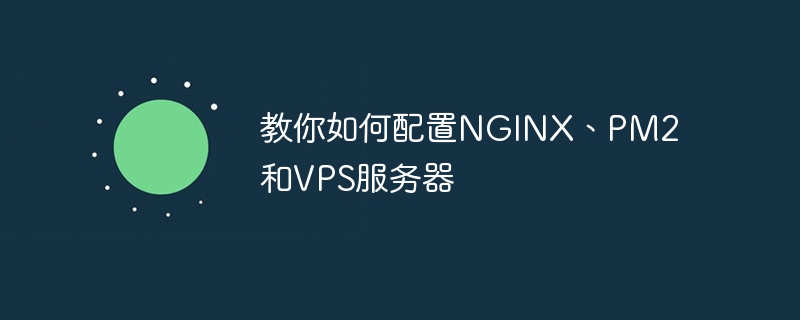

Teach you how to configure NGINX, PM2 and VPS servers
Introduction:
In modern website development, configuring an efficient server environment is crucial . NGINX is a popular high-performance web server, while PM2 is a powerful Node.js process management tool. This article will show you how to configure NGINX and PM2 on a VPS server and provide specific code examples.
Part One: Install and Configure NGINX
Step One: Install NGINX
To use NGINX as your web server, you first need to install it on the VPS server. Depending on the type of operating system you are using, choose the appropriate installation method.
For example, if you are using the Ubuntu operating system, you can use the following command to install:
sudo apt update sudo apt install nginx
Step 2: Configure NGINX
After the installation is complete, you can start configuring NGINX to adapt your website needs.
Open the NGINX configuration file:
sudo nano /etc/nginx/nginx.conf
Add the following content in the configuration file to forward the request to the PM2 managed Node.js application :
http { server { listen 80; server_name your_domain.com; location / { proxy_pass http://localhost:3000; // 将端口号改为你的Node.js应用程序端口号 proxy_http_version 1.1; proxy_set_header Upgrade $http_upgrade; proxy_set_header Connection 'upgrade'; proxy_set_header Host $host; proxy_cache_bypass $http_upgrade; } } }
Step 3: Start NGINX
After completing the configuration, start NGINX through the following command:
sudo service nginx start
Now, NGINX has been configured and running on your VPS server.
Part Two: Install and Configure PM2
Step One: Install PM2
To use PM2 to manage your Node.js applications, you first need to install PM2 on your VPS server.
You can use the following command to install:
sudo npm install -g pm2
Step 2: Start the Node.js application
Before using PM2 to manage your Node.js application, you need to ensure that the application has been deployed correctly.
Use the following command to start your Node.js application:
pm2 start your_app.js // 将"your_app.js"替换为你的应用程序文件名
Step 3: Configure PM2 to start automatically after booting
In order to ensure that the Node.js application starts automatically after the server restarts , you can use the following command to configure PM2 to start automatically at boot:
pm2 startup
After running the above command, you will receive a prompt message, just follow the prompt message to continue the operation.
Now, PM2 has been installed and configured.
Part Three: Deploy to VPS Server
Step One: Upload Your Application Files
Upload your Node.js application files to the VPS server, for example, you You can use the scp command to transfer files:
scp your_app.js username@your_server_ip:/path/to/your_app.js
Step 2: Enter the path where the application file is located
Use the following command to enter the path where the application file is located:
cd /path/to
Third Step: Start the application
Start your Node.js application using PM2, for example:
pm2 start your_app.js
At this point, you have successfully configured NGINX, PM2 and VPS server. Now your website can be accessed through the server's IP address or domain name.
Summary:
This article shows you how to configure NGINX and PM2 on a VPS server and provides specific code examples. By configuring NGINX and PM2, you can improve the performance and management capabilities of the server and achieve a better website experience. I hope this article was helpful and I wish you success with your server configuration!
The above is the detailed content of Teach you how to configure NGINX, PM2 and VPS servers. For more information, please follow other related articles on the PHP Chinese website!




